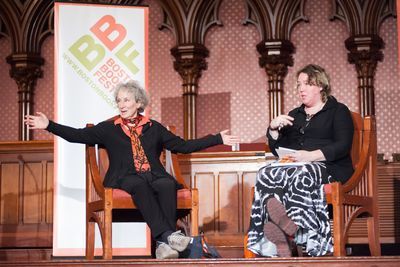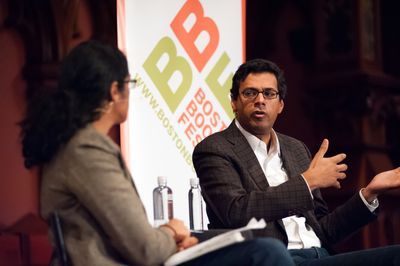Finding the plot around Copley Square

Margaret Atwood and Kelly Link; �� Mike Ritter/Ritterbin Photography
By MAREN MEINHARDT
The Boston Book Festival is now in its seventh year. From its inception, it has attracted enticing and high-profile writers ��� Orhan Pamuk delivered the keynote address at the inaugural event in 2009; since then, speakers have included Bill Bryson, Amartya Sen, Joyce Carol Oates, Siddhartha Mukherjee and Salman Rushdie.
This year���s event ��� a concentrated, high-energy affair taking place around Copley Square in the Back Bay area ��� was opened by Margaret Atwood. The talk had been sold out for months ��� the woman standing next to me and scanning the pews in the Old South Church sanctuary for a place to squeeze in confided that she had bought her ticket back in July.
Witty, elegant and infinitely gracious, Margaret Atwood generated instant adoration. Her conversation partner, Kelly Link (author of, most recently, a short-story collection called Get in Trouble) was clearly overawed, too, suggesting, at one point, that Atwood must be some kind of a deity, and thus immortal. ���Well, I���ve got news for you!���, Atwood cackled.
Atwood talked a bit about her childhood reading ��� beginning with comics that were considered harmful and had to be read secretly, under a flashlight. Her school reading, by contrast, seemed pleasingly untouched by such concerns. A book called Donovan���s Brain stood out in particular. It featured a brain floating around in a solution and being fed ���brain nutrients��� to keep it alive, until, unfortunately, it was ready to take over the world. Atwood declared that it had opened her eyes to the powers of literature: it turned out that the world was saved, and the brain successfully killed off, through the strategic deployment of some lines of poetry by Verlaine.
Medical themes had dominated Atwood���s life from early on, she explained. Her grandfather had been a doctor in Nova Scotia ��� somebody who made home visits on horse-drawn sleighs, and delivered babies on kitchen tables. The take-home message for Atwood���s mother was best summarized as ���don���t get sick���.
As to her own appetite for inflicting death and destruction in her dystopian MaddAddam trilogy (Oryx and Crake, The Year of the Flood and MaddAddam), Atwood shrugged off such suggestions elegantly. After all, she protested, ���I didn���t polish off anything except for the human race���. And anyway, the demise of mankind would probably be quite good for other life forms.
Atwood finished with a mini masterclass on how to best murder somebody on a ship. While I can���t give away too many details, the plan hinged on the fact that, when she first contemplated the problem, a high number of her fellow passengers happened to be called ���Bob���.
���How do you justify romantic love in a patriarchal society?���, one member of the audience asked her afterwards. ���I don���t know, it just happens���, Atwood replied, smiling, and then took a closer look at the questioner: ���how old are you?��� On learning she was twenty-two, Atwood said, encouragingly: ���you���re going to have fun. At twenty-two, you don���t know the plot. I know the plot of my life ��� most of it���s already happened. And I know how it���s going to end���.
How it is going to end is the question that occupied Atul Gawande in his keynote talk. A doctor at Massachusetts General Hospital and the author of the acclaimed Being Mortal, he talked about what happens when doctors, equipped with all possible medical competence, are faced with patients who won't get better. Our assumption that our most prized goals are health and independence is not happily reconciled with the fact that we live in a world where people (if they are lucky!, Gawande pointed out) will eventually get old and frail.
Three-quarters of patients, Gawande told us, accept care they do not want, because their families want them to. This had been what had happened in his own family, during his father���s last illness, and it had been an abiding source of regret.
What is important, he said, is to be clear what it is that we we want doctors to fight for. And this does not in every case equate with survival.
Gawande quoted a study which showed that people tend to be happier in their seventies than they were in their forties. Happiness is not necessarily compromised by physical limitations, but it is once a person stops being in charge. This is what happens fairly reliably when people become institutionalized. But, Gawande urged, when you���re in a wheelchair, you can be in charge; if you���ve got dementia, you can still be in charge. Wellbeing, he concluded, is something that is bigger than health and survival.

Atul Gawande interviewed by Meghna Chakrabarti; �� Mike Ritter/Ritterbin Photography
Peter Stothard's Blog
- Peter Stothard's profile
- 30 followers



